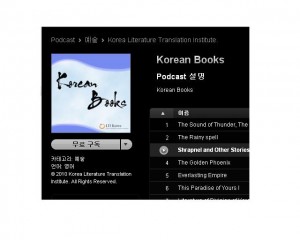 Quietly (meaning I somehow missed it^^) the LTI Korea has taken a brilliant step into its future.
Quietly (meaning I somehow missed it^^) the LTI Korea has taken a brilliant step into its future.
How?
By embracing social media.
This is not a first – last year LTI Korea put themselves up on the Wikipedia (the most important source of ‘qualified’ information on the English speaking web). This was a good start, but then seems to have completed and then kind of stalled.
I will say that the LTI Korea Wikipedia page was an epic win for KTLIT’s “Wikipedia Project” because the LTI Korea Wiki-page created an extra cross-link for most of the authors we have been putting up on the Wikipedia. You need at least three links or Wikipedia gives you a derogatory tag; the LTI Korea website made this threshold much easier to reach.
But now, they’ve put up an I-tunes channel for Korean Literature (note – the links on the LTI Korea page clunkily link to the I-tunes store, but don’t worry, it works!). (Link rotted)
Absolutely brilliant. 67 glorious VIDEO podcasts (and in French, Spanish, German and Chinese – this is a truly epic project).
The channel has its flaws, but right now those are completely unimportant. The New York Times just did a story on Stanford University and its brilliant coding students. In that article the NYT notes that for previous successes in Social Media, “the decision to launch immediately—rather than sit around perfecting the app—was crucial.”
And this is what LTI Korea has done, it has followed the Social Media model (again from the NYT article):
If ten people have the same idea for a piece of software, the one who succeeds will be whoever launches it fastest, then iterates as quickly as possible. “You have to be embarrassed by your first product,” says Lee, who helped create Geomon. “If you’re not embarrassed, you’re taking too long to get it out there.” As Feross puts it, “Done is better than perfect.”
As I sit here looking at the LTI Korea website and podcasts I am overflowing with connecting ideas. There should eventually be a link to stories from some of the authors involved. Perhaps LTI Korea could unfreeze some of its not yet published translations, perhaps it could link to the Korea Journal.
I am not qualified to figure out any copyright or contractual issues that might attach themselves to such a project, but it would be epic if such links could be established. Imagine a world in which someone browsing the internet could stumble upon one link to Korean literature online and could then follow an endless chain of links from video, to articles, to actual stories (selfishly, I want them to come to my blog as well!^^). Imagine all these pages were beautifully designed and in English that provided no stumbling blocks to the reader.
That is the win that LTI Korea has just put itself on the road towards.
Now.. the flaws…^^ Just some random notes I took whilst watching a few of the podcasts. Notes that might make the next iteration even better.
—————————-
Using movie adaptations as the basis to discuss the books is a poor idea, as is demonstrated by “Deep Blue Night” in which the sex of a main character has been changed.The movie was radically changed, including, apparently, adding some sexual tension by making one of the characters female.
The formats are a bit annoying with the kind of standard “rhetorical question” beginning so beloved of Korea, and a bit of stilted dialogue – they should really get native speakers to voice these rather than using the sing-song narrators they do.. Often times the clips pose a psychological question unrelated to the literature in questionand the Korean commentary sometimes seems randomly chosen… Also, some of the translation is a bit odd.
Some of the critical analysis is in the podcast is just plain off, as in saying the characters in Cho Se-hui’s The Dwarf retain their hope, when in fact their hope is systematically stomped out of them and the commentary actual ends up claiming it is a hopeful novel. The same is partly true of Ch’oe Yun’s There, a Petal Silently Falls. which at one point is
The non-controversial ones, like Kim Yu-jeong’s Spring, Spring are much better, for here Arirang doesn’t feel the need to dance around the content.


